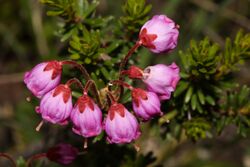Biology:Phyllodoce (plant)
| Phyllodoce | |
|---|---|

| |
| Phyllodoce empetriformis | |
| Scientific classification | |
| Kingdom: | Plantae |
| Clade: | Tracheophytes |
| Clade: | Angiosperms |
| Clade: | Eudicots |
| Clade: | Asterids |
| Order: | Ericales |
| Family: | Ericaceae |
| Subfamily: | Ericoideae |
| Tribe: | Phyllodoceae |
| Genus: | Phyllodoce Salisb. |
| Species | |
|
4 to 8, see text | |
Phyllodoce /ˌfɪləˈdoʊsiː/ is a small genus of plants in the heather family, Ericaceae. They are known commonly as mountainheaths,[1] mountain heaths, or mountain heathers.[2] They are native to North America and Eurasia,[3] where they have a circumboreal distribution.[4]
Description
Plants of this genus are subshrubs that occur in arctic-alpine regions.[5] They often grow from rhizomes, the stem bases formed by clumps of old leaf stalks. They have erect or spreading stems, the new shoots covered in glandular hairs, the old ones bare, tough, and shreddy. The leaves are alternately arranged. They have narrow, leathery blades that roll under tightly at the edges. The inflorescence is a solitary flower or an array of up to 30. The flower has a cup- or bell-shaped corolla of five petals that are fused together for at least half their lengths. There are usually ten stamens, which sometimes protrude from the corolla. The fruit is a capsule containing over 100 tiny seeds.[3][4]
Species
There are four to seven[4] or eight species[3] in genus Phyllodoce. Even after detailed phylogenetic analyses the relationships between plants in this genus are still unclear.[6]
Species include:[2]
- Phyllodoce aleutica – Aleutian mountain heath
- Phyllodoce breweri – purple mountain heath, red mountain heather, Brewer's mountain heath
- Phyllodoce caerulea – blue mountain heath, purple mountain heather
- Phyllodoce empetriformis – pink mountain heath, red mountain heath
- Phyllodoce glanduliflora – yellow mountain heath
Hybrids between species also occur.[3]
The name Phyllodoce belongs to one of the sea nymphs of Greek mythology.[3]
References
- ↑ Phyllodoce. USDA PLANTS. United States Department of Agriculture.
- ↑ Jump up to: 2.0 2.1 Phyllodoce. Integrated Taxonomic Information System (ITIS)
- ↑ Jump up to: 3.0 3.1 3.2 3.3 3.4 Phyllodoce. Flora of North America, Volume 8.
- ↑ Jump up to: 4.0 4.1 4.2 Phyllodoce. The Jepson eFlora. Jepson Herbarium, UC Berkeley.
- ↑ Rochefort, R. M., & Peterson, D. L. (2001). Genetic and morphologic variation in Phyllodoce empetriformis and Phyllodoce glanduliflora (Ericaceae) in Mount Rainier National Park, Washington. Canadian Journal of Botany, 79(2), 179-191.
- ↑ Ikeda, H., Yakubov, V., Barkalov, V., & Setoguchi, H. (2014). Molecular evidence for ancient relicts of arctic‐alpine plants in East Asia. New Phytologist, 203(3), 980-988.
Wikidata ☰ Q2417381 entry
 |

